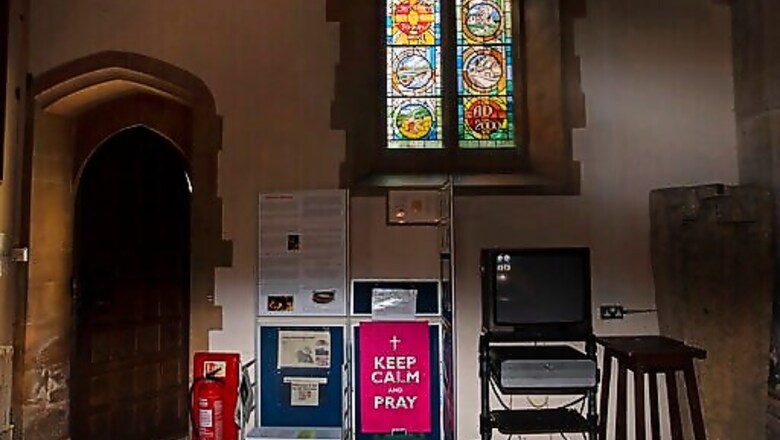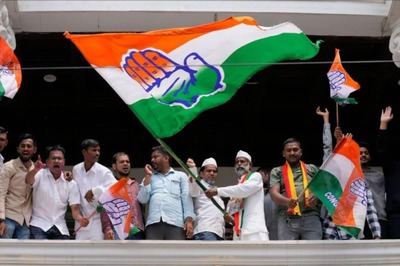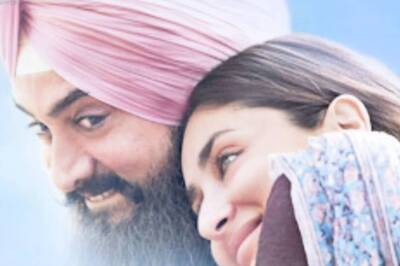
views
London and its environs are home to a notable diversity of faiths and flocks. Rites that have been the bedrock of their beliefs for centuries had to evolve swiftly during the pandemic lockdown to be safe and relevant for the faithful amid global uncertainty.
In the Hertfordshire county village of Northchurch, Anglicans normally worship in the more than 1,000-year-old St. Marys Church. That ended March 24 when the Church of England closed all its buildings, and Canon Rev. Jonathan Gordon began recording and broadcasting weekly services via smartphone with the help of Rachel Gordon, his wife.
It posed an immediate and immense challenge, the Rev. Gordon said. It meant that we had to completely rethink how we did everything.
In Neasden, a suburb northwest of London, a magnificent Hindu temple of carved stone constructed according to ancient Vedic architectural texts usually welcomes thousands of visitors a day. Now the BAPS Shri Swaminarayan Mandir gets just a trickle of devotees who book appointments online first to keep the crowds down and are told to wear face masks.
Everywhere there are reminders of the unusual times: Instead of donation boxes, smart screen devices flashing images of Hindu deities allow for contactless donations, and after each prayer session, workers in full-body protective suits swoop in to spray and sanitize any surface that may have been touched.
On a recent day at a suburban home in Hemel Hempstead, three female members of the Patel family dressed in their best saris watched attentively in their living room as Hindu swamis and gurus spoke to them through their video screen. That is what we would have worn to the temple, said Hemali Patel, so it felt only right to dress for the occasion.
Taking worship services virtual has been particularly challenging for the Orthodox Jewish community, members of which are proscribed from using electronics on Shabbat, their day of rest. Rabbi Mordechai Chalk broadcasts video services from his home Fridays just before sunset, as Shabbat nears.
Lchaim, he toasted in Hebrew recently, connected to the congregation via Zoom. His children ran into the picture in their pajamas to peer curiously at his laptop, before Shira Chalk, his wife, whisked them away for a bedtime story.
Nestled in the Chiltern Hills northwest of London, the Buddhist Amvrati monastery decided to simply close its doors and retreat inward to protect the communal way of life of its yellow-robed monks.
The monastery, whose name translates from the sacred Buddhist language of Pali as deathless realm, takes delivery drops at the back gate, and it took multiple rounds of negotiations before an AP journalist was allowed to enter, wearing a mask and gloves and observing strict social distancing.
Spokesman Ajahn Dhammanando said the reopening of the temple as the United Kingdom emerges from coronavirus lockdowns will happen with the utmost caution to avoid spreading COVID-19, and for the time being only for certain functions such as funeral ceremonies.
At the Cambridge Central Mosque in the city of the same name, Imam Ali Tos has found solace in a slow reopening and the mosques essential role in the lives of the faithful. Mats are now spaced a meter and a half apart during communal prayers, and worshippers are asked to bring their own. Peoples names and numbers are meticulously collected for possible contact-tracing purposes.
The mosque is not only a place of worship for Muslims, the imam said, it is the center of our lives.
Rabbi David Mason, who heads an Orthodox synagogue in North London, recalled going to a Jewish cemetery to preside over a funeral and being aghast at the rows of new graves, often several people being interred the same day.
It really hit me, you know, the number of dead that weve got, Mason said. And thats one cemetery of many.
But religions have endured trauma countless times before, and indeed, many of the tenets of faith held dear today were born out of hardship and suffering. And today’s pandemic has not been without its lighter moments.
Mason said he took joy from knowing tech-savvy volunteers were spending hours on the phone patiently helping older community members get online for services.
My high point during lockdown was when a 90-year-old lady came onto a Sunday night talk and explained how delighted she was, the rabbi said. Thats how communal collaboration works. I watched it work, and it was just wonderful.
___
Associated Press religion coverage receives support from the Lilly Endowment through the Religion News Foundation. The AP is solely responsible for this content.
Disclaimer: This post has been auto-published from an agency feed without any modifications to the text and has not been reviewed by an editor

















Comments
0 comment